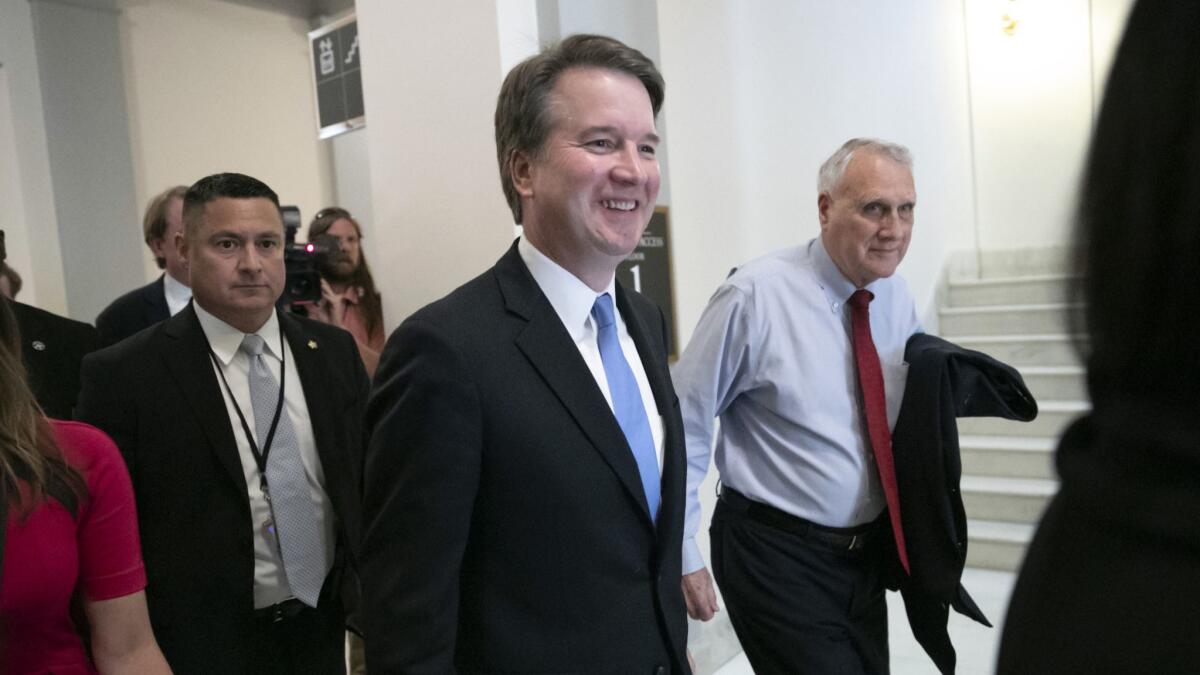Trump’s Supreme Court pick signals skepticism over GOP’s latest bid to repeal Obamacare

- Share via
Reporting from Washington — If Republicans are hoping Supreme Court nominee Brett Kavanaugh will help them knock down Obamacare in the courts, they might be in for a disappointment.
Kavanaugh has signaled in private meetings with Senate Democrats that he is skeptical of some of the legal claims being asserted in the latest GOP-led effort to overturn the Affordable Care Act.
The lawsuit, which has oral arguments next week in Texas, claims that because Congress last year effectively invalidated a key provision of Obamacare — the requirement that all Americans have health insurance — the entire 2010 law should be struck down.
After repeatedly failing to repeal Obamacare in Congress last year, Republicans are again turning to the courts to strike down the law, despite the fact that the Supreme Court has twice upheld it.
As Kavanaugh made the rounds on Capitol Hill in recent weeks, he suggested that even if one piece of the healthcare law is ruled invalid, the entire law doesn’t necessarily have to come down with it, three Democrats who were in the meetings told the Los Angeles Times.
In response to questions about the lawsuit, he declined to comment on it directly, but repeatedly pointed to the legal idea that one unconstitutional provision shouldn’t eliminate an entire statute.
Kavanaugh’s views on the issue could be important if the Texas case — which the Trump administration has partially endorsed — eventually makes its way to the Supreme Court, as some expect it will.
Democrats said they were viewing Kavanaugh’s comments warily, unsure if they indicated his beliefs or were merely an attempt to use legal semantics to alleviate fears that he would support the renewed legal attack on the Affordable Care Act.
Democratic senators are expected to press Kavanaugh on the issue during his confirmation hearing next week, particularly emphasizing the need to preserve Obamacare’s protections that ban insurers from refusing to cover people with preexisting medical conditions.
“I think this becomes the narrative of his nomination, which could bring it down,” said Sen. Sherrod Brown (D-Ohio), who met Kavanaugh earlier this month. “If people realize that their insurance is at risk because of this court nominee, I think there is going to be a lot of pressure put on a lot of people to vote no.”
Brown said it was unclear if Kavanaugh was using “legalese” to try to address Democratic concerns about the future of the healthcare law.
Kavanaugh did not directly indicate how he would rule on this or any other Obamacare case in the closed-door meetings, Brown and the other Democrats said. But when asked about the lawsuit, Kavanaugh repeatedly pointed to the legal concept of severability, or how much of a law needs to be invalidated when one piece is struck down by the courts.
“Asked about the Texas lawsuit, what Kavanaugh brought up was severability,” said another person who attended one of the meetings with a Democratic senator. The person did not want to be identified speaking about the private conversation.
His comments are likely to frustrate some conservatives who had criticized Kavanaugh’s views on an earlier Obamacare case.
In 2011, he wrote in a dissenting opinion that the courts couldn’t decide on the legal challenge to the individual mandate until the mandate and its penalty went into effect in 2014. He cited an obscure tax law that says Americans cannot challenge a tax until it goes into effect. At the time, the decision — which echoed a similar ruling in a different circuit court — was viewed as a way of dodging issuing a high-profile decision on the controversial healthcare law.
In some ways, Kavanaugh’s comments are not surprising. Conservative legal theory suggests that if one piece of a law is struck down, judges should limit how much of the remainder of the law needs to be unwound.
In 2016, he suggested in the Harvard Law Review that the courts develop a default rule that if a piece of a law is ruled invalid, judges should cut “the statute to the narrowest extent possible unless Congress has indicated otherwise in the text of the statute.”
In the same Harvard Review piece, he said deciding how much of the healthcare law could have been cut in the 2012 Supreme Court decision on the individual mandate is an “extraordinarily difficult question.”
Sen. Sheldon Whitehouse (D-R.I.) said the idea of severability did not come up in his meeting with Kavanaugh, but he left the meeting convinced that President Trump’s nominee would not protect the health law.
“I asked him if he could give me any assurance that he would not throw out statutory protections for insurance coverage for people with preexisting conditions, and he would not,” Whitehouse said.
At issue is a lawsuit filed by Texas and other GOP-led states that argues that the individual mandate is a foundation of the law, and without it, the entire law cannot stand.
The Trump administration responded to the suit by saying that Obamacare should not be struck down in its entirety, but that some parts should be invalidated, including protections for preexisting conditions.
Legal experts say the lawsuit is a long shot at best. But the Supreme Court has shown significant interest in cases related to the healthcare law, having heard four of them since 2012.
In the end, Kavanaugh’s position on Obamacare may not determine the law’s fate. The justice he was nominated to replace, Anthony M. Kennedy, voted in 2012 to strike the individual mandate.
It was Chief Justice John G. Roberts Jr. who angered Republicans by twice voting with liberal appointees to allow the law to stand.
Twitter: @jenhab
More to Read
Get the L.A. Times Politics newsletter
Deeply reported insights into legislation, politics and policy from Sacramento, Washington and beyond. In your inbox twice per week.
You may occasionally receive promotional content from the Los Angeles Times.











